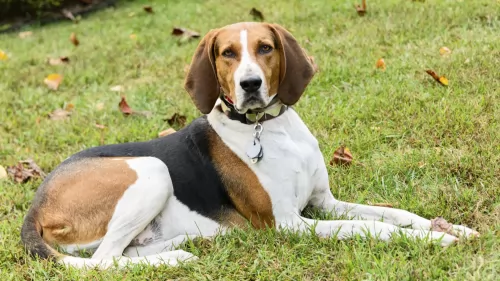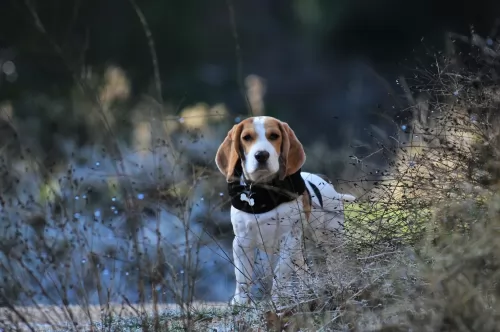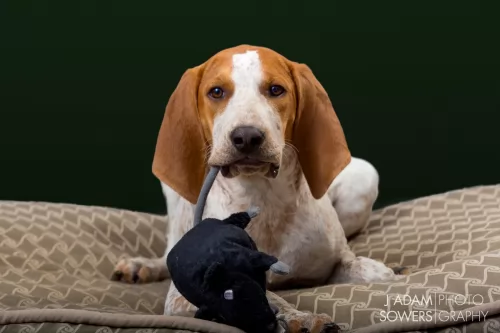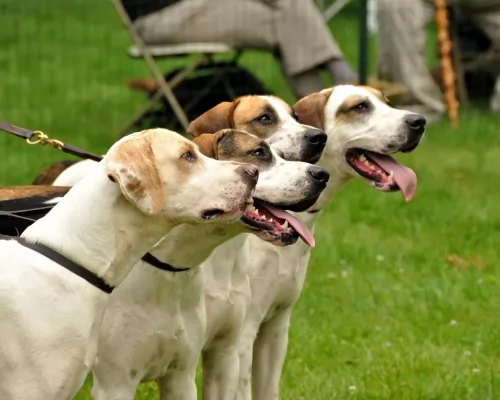 Petzlover
Petzlover American English Coonhound is originated from United States but Swedish Vallhund is originated from Sweden. American English Coonhound may grow 35 cm / 14 inches higher than Swedish Vallhund. American English Coonhound may weigh 13 kg / 29 pounds more than Swedish Vallhund. American English Coonhound may live 3 years less than Swedish Vallhund. American English Coonhound may have more litter size than Swedish Vallhund. American English Coonhound requires Low Maintenance. But Swedish Vallhund requires Moderate Maintenance
American English Coonhound is originated from United States but Swedish Vallhund is originated from Sweden. American English Coonhound may grow 35 cm / 14 inches higher than Swedish Vallhund. American English Coonhound may weigh 13 kg / 29 pounds more than Swedish Vallhund. American English Coonhound may live 3 years less than Swedish Vallhund. American English Coonhound may have more litter size than Swedish Vallhund. American English Coonhound requires Low Maintenance. But Swedish Vallhund requires Moderate Maintenance
 The American English Coonhound was developed in the Southern part of the United States from the variety of English hunting dogs that came to the States with the early settlers. At one point they were known as the Virginia Hound. This breed is well known for its prowess in hunting raccoons and her endurance and speed. Of course as a hound dog he loves to howl during the hunt and at home with the family. He can be frustrated and destructive if his energy and need for a job are not satisfied.
The American English Coonhound was developed in the Southern part of the United States from the variety of English hunting dogs that came to the States with the early settlers. At one point they were known as the Virginia Hound. This breed is well known for its prowess in hunting raccoons and her endurance and speed. Of course as a hound dog he loves to howl during the hunt and at home with the family. He can be frustrated and destructive if his energy and need for a job are not satisfied.
 Known also as the Västgötaspets or Swedish cow dog, the Valhund hails from Sweden. It’s a herding dog, and was always a farm dog in that country.
Known also as the Västgötaspets or Swedish cow dog, the Valhund hails from Sweden. It’s a herding dog, and was always a farm dog in that country.
It was in 1943 that the dog was first recognized as a breed by the Swedish Kennel Club. Only later, in 1996, did the American Kennel Club start registering the breed.
 The American English Coonhound is an athlete with a deep chest and cute face. They have broad heads, domed skulls, dark eyes and soft, low ears. They are as fast and athletic as they look. These are highly athletic dogs with long legs and a slim but muscular body. They are so well built for their hunting role, that any deficiencies are quickly identified and bred out of the breed.
The American English Coonhound is an athlete with a deep chest and cute face. They have broad heads, domed skulls, dark eyes and soft, low ears. They are as fast and athletic as they look. These are highly athletic dogs with long legs and a slim but muscular body. They are so well built for their hunting role, that any deficiencies are quickly identified and bred out of the breed.
 Looking much like a cross between a Corgi and the German Shepherd, the Swedish Valhund is a medium sized dog that stands between 30 and 34cm in height and weighs between 9 and 14kg.
Looking much like a cross between a Corgi and the German Shepherd, the Swedish Valhund is a medium sized dog that stands between 30 and 34cm in height and weighs between 9 and 14kg.
His medium length weather-resistant coat is available in wolf like shades – cream, grey, brown etc. The tail can be long or bobbed and the medium sized ears are held erect.
Intelligent, confident, independent, alert, playful and active, your Swedish Valhund promises to make a good family pet.
You'll need to be an active, outdoor type of family though, as he isn’t a couch potato type of dog, snoozing in front of the TV.
He wants to be up and about going on long walks or playing ball games that give him a good run. If he gets his fair share of exercise he can adapt to life in the city or the countryside.
He just loves his human family and wants to be constantly with them. He won’t do well if you just keep him locked outside away from everyone. He is social, alert innovative and entertaining as well as being a good guard dog.
 The American English Coonhound knows how to relax just as much as he knows how to work. He is mellow after work and tenacious in the chase. This is not the dog for a first-time owner. They are stubborn and hard to train. They howl and bark at home as much as they do on the hunt. They need a strong pack leader, especially when living in the city or neighborhoods.
The American English Coonhound knows how to relax just as much as he knows how to work. He is mellow after work and tenacious in the chase. This is not the dog for a first-time owner. They are stubborn and hard to train. They howl and bark at home as much as they do on the hunt. They need a strong pack leader, especially when living in the city or neighborhoods.
They are outgoing and friendly and very sensitive. They mature later than most other breeds their size. They are about 2 when they mature.
 Your Swedish Valhund is such a confident, independent dog and he promises to be a loving, faithful pet. He's also alert and will let you know if strangers are approaching his property.
Your Swedish Valhund is such a confident, independent dog and he promises to be a loving, faithful pet. He's also alert and will let you know if strangers are approaching his property.
He is a calm, easy going pet and is capable of adapting to quiet or noisy homes. He may be quite a strange looking dog, but he's got a whole lot of loving to give.
 If kept active and happy, the American English Coonhound has very few health problems. The benefit from a large gen pool but do have some health concerns including elbow and hip dysplasia, ear infections, cataracts, bloat, and Progressive Retinal Atrophy. They do have a tendency to gain weight as they age. These issues will be addressed in more detail below. DNA testing is available for the dysplasia and eye issues.
If kept active and happy, the American English Coonhound has very few health problems. The benefit from a large gen pool but do have some health concerns including elbow and hip dysplasia, ear infections, cataracts, bloat, and Progressive Retinal Atrophy. They do have a tendency to gain weight as they age. These issues will be addressed in more detail below. DNA testing is available for the dysplasia and eye issues.
 Capable of living a long, healthy life, the Swedish Valhund isn’t likely to fall victim to some of the many dog illnesses there are, and yet it is wise to be alert to some of them that he could get.
Capable of living a long, healthy life, the Swedish Valhund isn’t likely to fall victim to some of the many dog illnesses there are, and yet it is wise to be alert to some of them that he could get.
One of these is an hereditary eye disease known as retinopathy. Its where there is degeneration of the retinal photoreceptor cells. This eye disease can lead to blindness.
You need to be careful with this pet of yours, because with his long back and short legs he can so easily hurt his back if he leaps off a bed or high chair.
Whenever you pick this dog up, always support his legs and back. Don’t pick them up without supporting both the front legs and the rear end.
 your working American English Coonhound needs different food than one who is not working. So, if you hunt with your dog remember he really needs the calories to keep his energy up. However, they can get obese as they age so cut back with less activity and more years. Watch the number of treats when training.
your working American English Coonhound needs different food than one who is not working. So, if you hunt with your dog remember he really needs the calories to keep his energy up. However, they can get obese as they age so cut back with less activity and more years. Watch the number of treats when training.
Elbow and Hip Dysplasia – the joint issues prevent the bones from connecting and functioning properly. Any good breeder of American English Coonhounds will do tests for both.
Eye issues range from cataracts to PRA (Progressive Retinal Atrophy) Again there are tests available for these conditions.
Bloat is a condition many medium to large size dogs can experience when their stomach can become inverted and intestines distended. The is a situational issue and can’t be predicted. Don’t allow your coonhound to wolf down food right before exercise and feed him more than once a day in a smaller meal.
The American English Coonhound needs a lot of exercise and has an extremely strong work and prey drive.
 Try and feed your Swedish Valhund two meals a day instead of just one, so that he doesn’t gobble down his food too quickly.
Try and feed your Swedish Valhund two meals a day instead of just one, so that he doesn’t gobble down his food too quickly.
Your dog can be prone to obesity, so you have to be careful with the way you feed him. Overfeeding a dog packs on extra weight and this puts strain on the joints.
Apart from the dry kibble that you feed him, try to include some tasty, nutritious homemade food such as boiled chicken, brown rice or pasta, sweet potatoes, carrots and spinach.
This can all be chopped up and added to his dry kibble. Some raw meat added to the diet can only be to his benefit. Remember to always ensure a bowl of fresh, cool water is available.
Give his thick coat a brush twice a week to remove dead hair. Brushing also stimulates the sebaceous glands that produces oil which gives the coat is sheen.
Trim his nails because left long, they can hook onto things and rip the skin open.
Check inside the ears too for redness which could mean an ear infection.You get dog wipes that you can wipe the ear out with. There are always professional dog groomers who can do these chores for you if you don't want to.
See that his vaccines are up to date and that if he shows signs of illness, you get him to the vet.